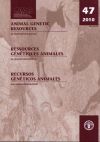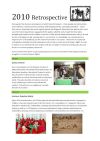New in Animal Genetic Resources

The newest issue of the journal Animal Genetic Resources contains two articles by LPP members:
Marketing products from local livestock breeds
An analysis of eight cases
Evelyn Mathias, Paul Mundy and Ilse Köhler-Rollefson
This 12-page article summarizes the book Adding value to livestock diversity published by LPP, LIFE Network, IUCN–WISP and FAO.
Abstract
Local breeds and minor species are hardy and able to thrive in harsh conditions. Their adaptive traits and unique characteristics (coloured wool or hides, extra-fine fibre, meat or milk with special tastes) offer opportunities for the marketing of speciality products and sustainable food production in marginal areas. This study discusses eight initiatives from Africa, Asia and Latin America that help communities to produce and market various products for niche markets: milk and dairy products from dromedaries; cashmere, wool and handicrafts from goats, sheep and Bactrian camels; and meat, meat products and handicrafts from goats and sheep. The main strategies were to seek new markets for existing or entirely new products (rather than trying to exploit existing markets). Most initiatives had some form of branding or labelling, and two had protected their products with geographical indications. Such marketing initiatives can be started with limited capital inputs but are skill and knowledge intensive. They require strong commitment to overcome seasonal fluctuations in production, the lack of infrastructure and services, and difficulties in institution building. But when well planned and carefully managed, they can help conserve breeds as well as provide a livelihood for people involved in the value chain, allowing actors earlier in the value chain – livestock keepers and small-scale processors – to capture a greater share of the value of the end product than they would by trying to serve a mass market.
Livestock keepers’ rights
The state of discussion
I.U. Köhler-Rollefson, E. Mathias, H. Singh, P. Vivekanandan and J. Wanyama
Abstract
Livestock keepers’ rights (LKR) is a concept developed by civil society during the “Interlaken process” and is advocated for by a group of non-government organizations, livestock keepers, pastoralist associations and scientists who support community-based conservation of local breeds. This study provides an overview of the rationale, history and content of LKR and suggests that biocultural or community protocols are a means of invoking the principles of LKR even in the absence of their legal enshrinement. It is concluded that besides striving for legal codification of LKR its principles should form the basis of pro-poor and ecological livestock development in general.
2010 retrospective for livestock keepers

“It has been an amazing year for livestock keepers”, says LPP’s Ilse Koehler-Rollefson. “They have fought for their rights, all with the aim of bringing one big message across: our knowledge, our commitment, are important for rural livelihoods, for the environment and for consumers.”
Read her summary of the year’s events.
The cow is no climate-killer
Die Kuh ist kein Klima-Killer
Wie die Agrarindustrie die Erde verwüstet und was wir dagegen tun können
Anita Idel, 2010.
Metropolis Verlag für Ökonomie, Marburg. In German.
Cows belch methane – a greenhouse gas 25 times more powerful than carbon dioxide. Concerns about a changing climate have led many to call for curbs on cattle and other ruminants such as sheep, goats and buffaloes.
This book by LPP member Anita Idel argues that cattle and other livestock are vital for food production and to use land that cannot be cultivated. But they must be managed in the right way. Feeding them with intensively cultivated maize and soybean indeed harms the climate: synthetic fertilizers require a lot of energy and release nitrous oxide – a greenhouse gas that is 295 times more potent than carbon dioxide.
This book looks at the relationships between the soil, vegetation and animals. It argues that all depends on the sustainable grazing management of the livestock. Allowing them to graze on pasture converts vegetation into meat and milk, protects and enriches the soil, and minimizes the production of extra greenhouse gases.
An English version of the book is planned for 2011.
Summary (in English)
- Go to the previous page
- 1
- …
- 40
- 41
- 42
- 43
- 44
- 45
- 46
- …
- 86
- Go to the next page
